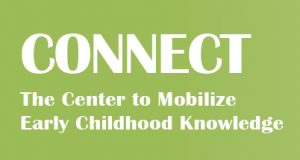 The Center to Mobilize Early Childhood Knowledge has released CONNECT Module 3: Communication for Collaboration, new module focused on communication practices that can be used to promote collaboration with professionals and families in early care and education, and intervention settings.
The Center to Mobilize Early Childhood Knowledge has released CONNECT Module 3: Communication for Collaboration, new module focused on communication practices that can be used to promote collaboration with professionals and families in early care and education, and intervention settings.
CONNECT Modules are designed using an evidence-based approach to professional development. All CONNECT modules and accompanying materials are free. Resources include video and audio clips, activities, and handouts. The modules are focused on teaching and intervening effectively with young children in a variety of early learning environments and inclusive settings and are designed to be embedded into existing curricula, coursework, and other professional development opportunities. Each module is designed to build early childhood practitioners’ abilities to make evidence-based decisions. The modules emphasize a decision-making process, realistic problems to solve, the importance of integrating multiple perspectives and sources of evidence, the relevance and quality of content, and feedback. Each module has five steps:
- Dilemma–Consider a dilemma.
- Question–Turn the dilemma into an answerable question.
- Evidence–Consider key sources of general evidence (definition, research, policies, experience-based knowledge).
- Decision– Integrate sources of evidence with different perspectives and unique contexts to make an informed decision.
- Evaluation–Evaluate the practice decision.
CONNECT: The Center to Mobilize Early Childhood Knowledge is a partnership between the FPG Child Development Institute at the University of North Carolina, the University of Kansas, and the University of Kentucky and is funded by the US Department of Education’s Office of Special Education Programs. With its modules, CONNECT “is developing web-based, instructional resources for faculty and other professional development providers that focus on and respond to challenges faced each day by those working with young children and their families in a variety of learning environments and inclusive settings.”

